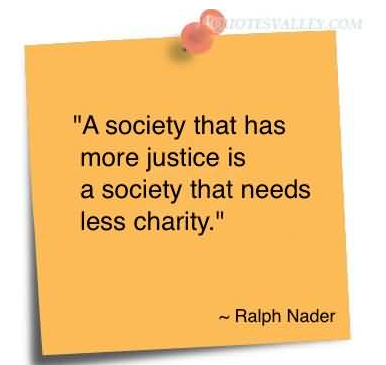You can tell a lot about a society by what its citizens compliment themselves about. You might also learn a great deal about a society’s insecurities by what citizens say to make themselves feel good.
The United States is perhaps the most charitable nation in the world. According to the 2014 World Giving Index, the U.S. actually tied with Myanmar (you can use that factoid to win some points, somewhere, somehow). The U.S. is the only country that ranked in the top ten of each of the three categories: (a) the percentage of people who donate in a typical month to charity, (b) volunteer time and (c) help a stranger.
This is much to gloat about, but is it possible that this positive trait covers up shameful statistics for the United States?
We are proud of the money and sweat equity we give to food panties. According to the non-profit Feeding America, the U.S. has 200 food banks and 60,000 food pantries and meal programs that provides food and services to people each year. But our pride is possible only because according to the U.S. Department of Agriculture, one in six people in America faces hunger. If wealth were distributed in the United States so that all people had the financial resources to feed themselves, then there would be no need for charity to be a source of food for our citizens. America would be less charitable.
More than 3.5 million Americans experience homelessness each year. The figure is nearly 580,000 each night. Thirty-five percent of the homeless population are families with children, the fastest-growing segment of the homeless population. Twenty-three percent are U.S. military veterans. Yet hundreds of churches and other non-profit organizations run shelters for the homeless. Americans are indeed very charitable towards these organizations, but it is no substitute for a nation in which every citizen has sufficient income or wealth to have a roof over his or her head. We make charity possible by failing to insist that government fulfill its obligation to provide a basic standard of living for all Americans.
It is basically Republican politicians who stand in the way of providing a livable safety net for American citizens. They oppose: raising minimum wages, offering a guaranteed income, expanding Social Security and Medicare where necessary, fully funding health care for veterans, and providing even minimal health care for many poor people in states that resist Medicaid expansion. Who benefits from Republican obstinacy? Three sectors of our society:
- American business, which pays lower taxes because we do not fully fund a safety net. At the same time, business brag about their charitable donations, even though they are far smaller than would be their fair share in providing a livable level of income for all Americans.
- Churches and other religious organizations, who benefit from the holes in the safety net. Churches can take the lead in charitable enterprises. But if the government was taking care of all Americans, religious institutions would be largely stripped of their charitable functions. That in turn would likely be a disincentive for many Americans to join or remain members in religious organizations.
- Wealthy people in the United States, who can brag ’til the cows home about how charitable they are, even though the amount that many give is far less than what would be their fair tax in a society that cared for its poor, its infirm, its children, and its senior citizens.
I previously wrote about how Republicans are more charitable than Democrats and Europeans. They love to brag about it. They and the causes that they support receive ongoing adulation from Americans, particularly from mainstream media outlets. What is not said is that it’s all a good economic deal for Republicans. They are able to pay less and brag more. Regrettably, this may be too difficult a concept for most Americans to understand.
